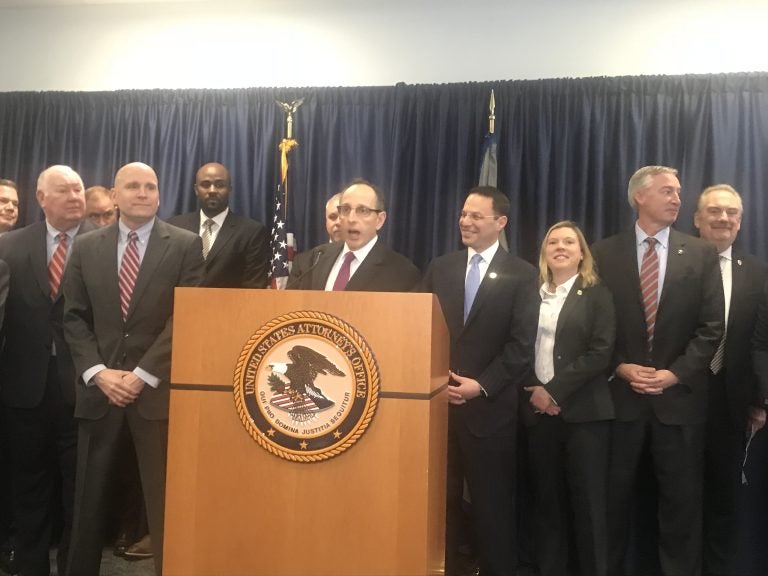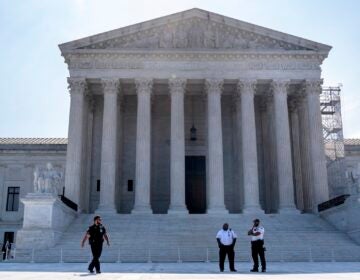Philly plan for safe-injection site ‘oxymoronic,’ U.S. attorney says
Federal prosecutor opposes opening a facility for illegal drug use in Philadelphia. City officials say it's part of an effort to get users into treatment — and save lives.
Listen 2:22
U.S. Attorney Lou Lappen says Philadelphia's idea of establishing a facility for those struggling with opioid addiction to use drugs under medical supervision sounds like a “self-suicide site.” (Bobby Allyn/WHYY)
The top federal prosecutor for the Philadelphia area called the concept of safe-injection sites “oxymoronic,” saying that establishing a facility for those struggling with opioid addiction to use drugs under medical supervision sounds like a “self-suicide site.”
“You’re talking about an extremely dangerous situation with people injecting these drugs into their veins that is killing them at rates we have never before in the history of the world,” said Lou Lappen, U.S. attorney for the Eastern District of Pennsylvania. “We can’t just say, ‘Wow, that’s a great idea.’ ”
Lappen, who had not previously addressed the issue publicly, made his comments Thursday at a press conference on forming a task force of state and federal prosecutors to bolster law enforcement resources for charging opioid sellers and distributors.
His harsh words foreshadow what is likely in store for top Philadelphia leaders as they move ahead with plans to welcome the country’s first city-sanctioned facility for opioid users monitored by trained staff.
Opioids were the main driver in what officials believe were 1,200 overdose deaths in Philly last year. That’s four times the city’s murder rate. That helped convince city officials to back an injection site as part of the response to the crisis.
In a recent op-ed in the Philadelphia Inquirer, Mayor Jim Kenney and District Attorney Larry Krasner wrote that a supervised injection site would focus on moving drug users into treatment.
“These sites are expected to take some people off the streets where their active addiction impacts the safety and environment of the rest of the neighborhood,” the city leaders wrote. An injection site would be “more than a place where people in addiction will use drugs under supervision – the sites will also provide a direct link to treatment, resources for housing and meals, and, most important, save lives.”
Philadelphia Health Commissioner Tom Farley said in a statement that while the city appreciates Lappen’s comments, “our primary concern is to save the lives of Philadelphians in the grip of addiction to these drugs,” adding that safe injection sites “have been proven to save lives in cities around the world.”
Farley said an injection site would be just one part of a larger strategy to curtail doctors over-prescribing opioids, while moving more of those addicted into treatment.
“We’re fully aware — and have made clear — that there are many discussions to be had with various partners and stakeholders before a site is up and running,” Farley said.
As the city continues to champion the controversial idea, however, opposition is sharpening. And the threat of a possible federal crackdown on such a facility represents a formidable obstacle.
On Thursday, Lappen refused to comment on whether federal prosecutors are in talks with city leaders about the proposal, nor would he elaborate on how the federal government would respond to a safe-injection site opening in Philadelphia.
“I’m not speaking on whether there will or will not be any crackdown,” Lappen said.
In the coming months, Lappen is expected to be replaced by lawyer Bill McSwain as the top federal law enforcement official for the Philadelphia area. President Donald Trump nominated McSwain to the post in December, but he is still awaiting approval from the U.S. Senate.
McSwain, a conservative lawyer and Republican donor with support from both of Pennsylvania’s U.S. senators, has not discussed his position on safe-injection sites.
Still, one thing is not likely to change any time soon, Lappen said.
The U.S. Department of Justice “is not supportive of the idea of a safe-injection site,” he said. “It speaks to the horror of the situation we find ourselves in and doesn’t seem to be the best way to address a crisis.”
WHYY is your source for fact-based, in-depth journalism and information. As a nonprofit organization, we rely on financial support from readers like you. Please give today.




